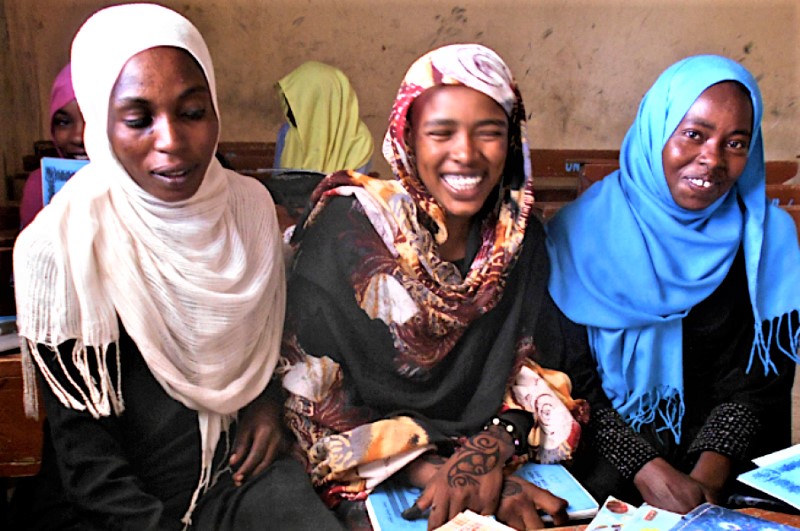

In our fast-changing world, the need for inclusion often takes the spotlight in conversations about social justice. Yet, countless individuals and communities remain marginalized, left outside the boundaries of opportunity and equality.
"Walking with the excluded" is not just a phrase; it is an invitation to engage deeply with these communities, learn from them, and advocate for meaningful change. This mission resonates with the core work of the Jesuit Refugee Service (JRS), which has been working for decades to restore dignity and offer hope to those who are marginalized.
The nature of exclusion can take many forms—economic, social, and cultural—and it affects people for various reasons, including race, gender, socioeconomic status, disability, and sexual orientation. To foster empathy and promote inclusive environments, it is essential to understand these overlapping layers of exclusion. Here in Maban, we witness some of the harshest realities of this exclusion firsthand. Maban hosts vulnerable populations, including refugees fleeing the ongoing conflict in Sudan, as well as internally displaced persons (IDPs) affected by inter-community and political strife. The work JRS carries out in Maban highlights the urgency of addressing this widespread marginalization.
Through my daily encounters with people at risk, I’ve come to realize the crucial role that empathy plays in confronting exclusion. Walking alongside marginalized individuals enables us to gain a deeper understanding of their lived experiences. Empathy serves as the foundation of advocacy—it closes the gaps between communities and cultivates solidarity. Listening to the stories of those who are marginalized allows us to better grasp the challenges they face and to admire the resilience they display in the face of adversity. However, there is a significant gap between exclusion and inclusion, one that can only be bridged through mental health and psychosocial support for displaced individuals and refugees.
During my work with JRS and through my interactions with excluded individuals in Maban, I have identified several practical steps for helping reintegrate the excluded back into the community. Through both group sessions and one-on-one encounters with refugees, I’ve gathered invaluable insights into their concerns and feelings.
Here are some key steps for building empathy and fostering inclusion:
Listen Actively – Engage in conversations with marginalized people. Listen without judgment and allow their stories to be heard and understood.
Educate Yourself – Equip yourself with knowledge. Read books, watch documentaries, and attend workshops that highlight the experiences of excluded communities. Knowledge empowers advocacy.
Support Local Initiatives – Get involved with organizations working to uplift marginalized groups. Volunteering or donating to local initiatives helps amplify the voices of those who are often silenced.
Advocate for Policy Change – Use your voice to push for inclusive policies. This might involve writing to local representatives or participating in community discussions focused on equity.
Reflect on Privilege – Acknowledge your own societal position and how privilege influences your interactions. Understanding this allows for more sensitive and productive conversations about exclusion.
Ultimately, inclusion is the antidote to exclusion, and it underscores the transformative power of community. Walking with the excluded means building a space where everyone feels valued and heard. When we unite in purpose, we can challenge systemic barriers and work towards a more equitable society. Reconciliation—another essential aspect of inclusion—requires not only standing with the excluded but also bringing together conflicting parties whose differences perpetuate exclusion.
Through my conversations with one particular refugee, I was struck by her courage as she opened up about the challenges she faces. With the support of JRS and other agencies, she has been able to find a sense of belonging within the community. It was a joy to see the positive change in her, reflecting how powerful it can be when marginalized individuals are given the support they need to reclaim their dignity.
Walking with the excluded is a journey of learning, growth, and commitment. It demands empathy and, most importantly, action. By standing in solidarity with those who are marginalized, we take concrete steps toward a world where inclusion is not just an ideal, but a lived reality for all.
Related Articles


Select Payment Method
Pay by bank transfer
If you wish to make a donation by direct bank transfer please contact Fr Paul Hamill SJ treasurer@jesuits.africa. Fr Paul will get in touch with you about the best method of transfer for you and share account details with you. Donations can be one-off gifts or of any frequency; for example, you might wish to become a regular monthly donor of small amounts; that sort of reliable income can allow for very welcome forward planning in the development of the Society’s works in Africa and Madagascar.
Often it is easier to send a donation to an office within your own country and Fr Paul can advise on how that might be done. In some countries this kind of giving can also be recognised for tax relief and the necessary receipts will be issued.




